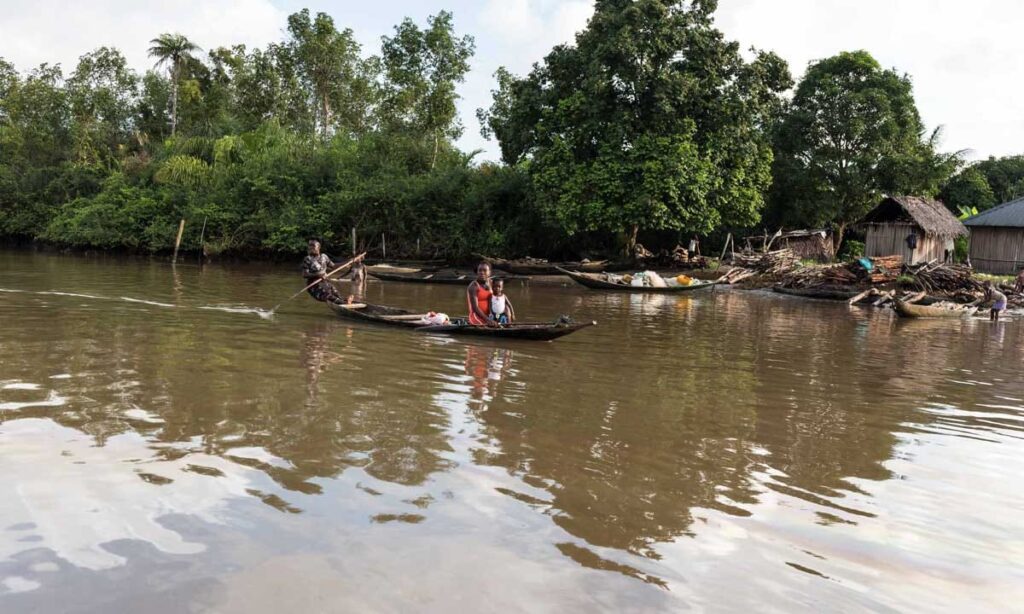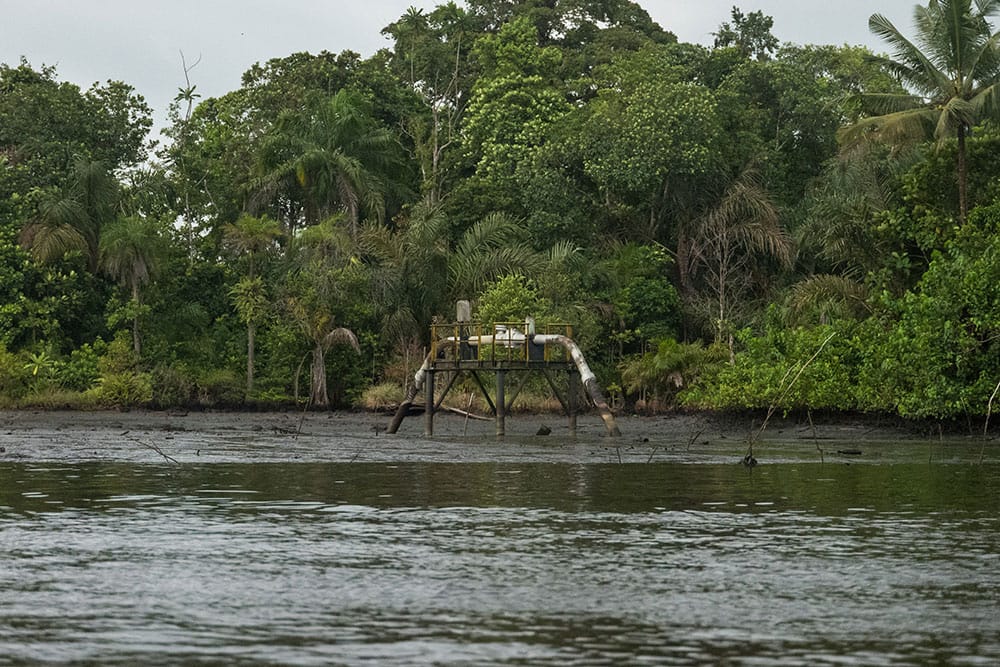- Columns/Opinion
- No Comment
Nation Of The Living Dead: Slapped, Oppressed, Does Ikwechegh Represent It?

3rd November 2024, NewsOrient, Opinion, Column, News, Governance And Development, Law And Society
By Ikeddy ISIGUZO
MINUTES after we rendered the last stanza of the national anthem with impressive passion, the lyrics put us to immediate judgement as the tales of woes that were painted had deep strokes that held their hues.
Silence descended on the hall, making the voices on the devastations of oil and gas exploration – maybe, exploitation is better – in the Niger Delta, more eerie.

We had just sung:
O God of all creation,
Grant this our one request,
Help us to build a nation
Where no man is oppressed,
And so with peace and plenty
Nigeria may be blessed.

Each of those lines put us on trial as speaker after speaker discussed the report that John Tucker Mugabi Sentamu, 75, a retired Anglican bishop, and life peer, who was Archbishop of York and Primate of England from 2005 to 2020, delivered its summary in a quivering voice that appeared propelled by anger at what human beings can reduce other human beings to profit from oil and gas.
The words tumbled off his tongue in a rapidity that set his Swahili accent in a perpetual battle for superiority with the English language much like the same perpetual disdain the oil companies and Nigerian governments have for any ameliorations of the living conditions of the peoples of the oil-producing areas.
At the international conference on environment, the report of the Bayelsa Oil and Environmental Commission presented in Abuja on Wednesday, showed the dark sides of oil and gas production glittering from a documentary in which darkness was so pitched that no lighting could brighten it a bit.
Waters, farm lands, residences, animals, people are mere soots dressed in layers of the darkness of mis-managed oil spillages. More oil wells, more explorations, more millions of barrels per day mean more meaningless life for inhabitants of the areas, the least of whose woes is that they could be kicked out of their lands once substantial crude is found under their feet.
The report, – An Environmental Genocide, The human and environmental cost of Big Oil in Bayelsa, Nigeria _, is scientific, used verifiable data, and drew from hundreds of interviews, visits to sites of pollutions, and engagements with affected communities, many of which had lost every hope of their cries being heard. All stakeholders were represented.
Communities had for over six decades been devastated, cultures lost, and future generations are guaranteed diseased existence from their polluted environments. The curse of oil has cost them the present. Those who make it to the future would arrive their destination loaded with toxins that could lower the quality of their lives to the point that they could be a different specie of the human race.
While other children would inherit healthy genes from their forebears, children born in Bayelsa would be of indeterminate genes because of illnesses that their parents have, foods and water that are polluted beyond considerable safe levels and the worsening settings of where they would be born.
Some diseases found in the Niger Delta are new, local to the areas, unknown or where they are known, the improvised peoples of the areas cannot afford the medications and treatments they need.
Central to these pollutions is oil spillage that the oil companies blame on sabotage, their way of blaming youths of the region for the spills. The report’s findings do not support this position.
“Analyses suggest that Nigeria’s pipelines are 565 times more likely to spring a leak per 1,000 kilometres than those in the EU,” says the report. About 21,000 kilometres of these pipelines ring the Niger Delta, taking products from over 5,000 oil wells to export terminals and refineries.
Efforts to harness the travials of Bayelsa and the surrounding States into a scientific report that could be used in solving the problems that oil exploration has imposed on the peoples and environment of the Niger Delta, especially Bayelsa, were activated in 2019 by Governor Seriake Dickson who instituted the Sentamu Commission and received its interim report in 2020 before he left office.
“I know that by 2021/2022 they submitted their final report which was presented in London in the House of Lords. I was delighted that they came to make a presentation of the final copy to the State, which has formally adopted it at the State Executive Council,” Dickson, now a Senator, and Chairman of the Senate Committee on Environment and Ecology, said at the event which he also chaired.
The completion of the report is a milestone, a lot of work still has to be done, Dickson said. “I call on all the Governors of oil-producing States, and the people of the Niger Delta generally, to rally round and use this report as a basis for our quest for a safer environment. All of us must rise up for Bayelsa and the Niger Delta and fight against environmental terrorism, which the Commission has clearly found to be a genocide,” Dickson said.
The report is unrelenting in its case against the oil companies and the slackness of the regulatory agencies. “A study conducted on pipelines in six States in the Niger Delta found that more than 70% of the pipelines were over 20 years old and over 40% were more than 30 years old with much of the infrastructure suffering from mechanical failures due to poor construction and maintenance,” according to the report.
More frightening pictures emerge as we peep through the darkness of oil production, the Nigerian version.
King Bubaraye Dakolo, Chairman, Bayelsa Traditional Rulers Council, was illustrative with his sketching of the destructions that oil exploration cause. “You can call me the living dead,” he said, using data from the report on the levels of toxins found in tests conducted on the inhabitants of the areas. They were horrifying data.
“Overwhelming tide of oil contamination and associated activities such as dredging, mangrove and swamp forest clearance, and artisanal refining has turned the Niger Delta – home to some of the planet’s largest mangrove and freshwater swamps, forests, and Africa’s largest wetlands – into one of the most polluted places on Earth.
Bayelsa is one of the States most affected within the Niger Delta,”the report lamented.
“Since 2006, oil produced in Bayelsa generated over US $150 billion for the Federal Government and billions for the international oil companies that operate its wells,” said the report.
There is no evidence yet that a cent is kept anywhere for the $12 billion that the report said would be required to clear the pollution.
Governments are occupied with squeezing more oil and gas out of the areas than fix the damage to people and places. Nobody is being held responsible for the future of the people.
“Oil producers are already beginning to divest themselves of their onshore assets to evade potential liability for historic pollution. There is an urgent need for action now,” the report warns.
Dreary as the devastations of oil are, the most commanding news item was Honourable Alex Ikwechegh, of the House of Representatives, slapping his way to prominence by brutalising a taxi driver whose major or general offence was failure to realise that he was before Ikwechegh, who was so majestic that he wondered if people knew who he was, and that he was magical with his abilities to cause people to disappear.
Ikwechegh too is a subscriber to a “nation where no man is oppressed”.
Then Nyesom Wike talks down on residents of the Federal Capital Territory, calls them names, and nobody calls Wike to order. He takes his imperious bearings to Rivers State, sustaining different manners of lawlessness there. He too swore to the Constitution and attends events where the national anthem reminds him of our aspirations to “a nation where no man is oppressed”.
Fuel increases, continued brutality by security agencies, and the dedicated manhunt for Bobrisky all slap us, oppress us, and enlist us among the living dead.
As our governments, National Assembly, and all those who can do something about the Niger Delta, which they live off, turn blind eyes to the plight of the region, we should understand more, why they do nothing about the rest of us.
Can’t we just agree that we are building a nation where oppression is a national value?
Finally…
THOSE street beggars, some of them minors, accused of terrorism, and planning to change President Bola Ahmed Tinubu’s government illegally, should be released and compensated.
There must be limits to ridiculousness.
ISIGUZO is a major commentator on minor issues
~ NewsOrient
For News, Interviews, Special Events Coverage, Advertisements, Corporate Reports, etc., Contact:
Email: Newsorientng@gmail.com
Website: https://newsorientng.com
Phone: +2348023165410; +2348064041541
